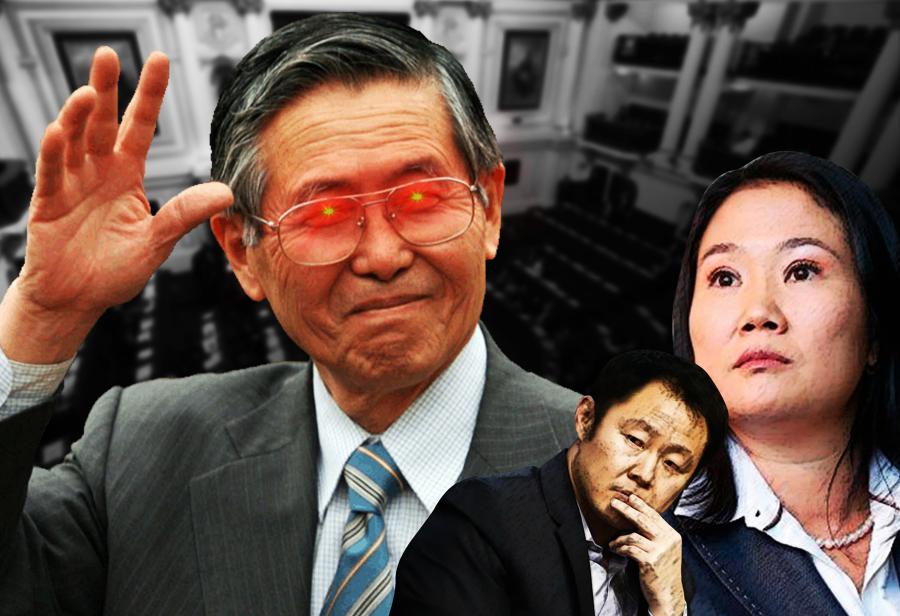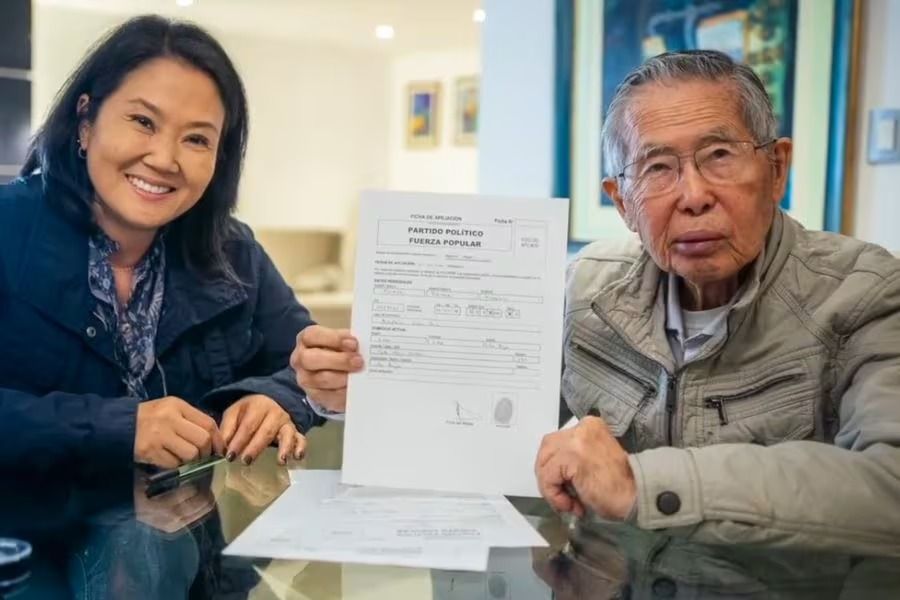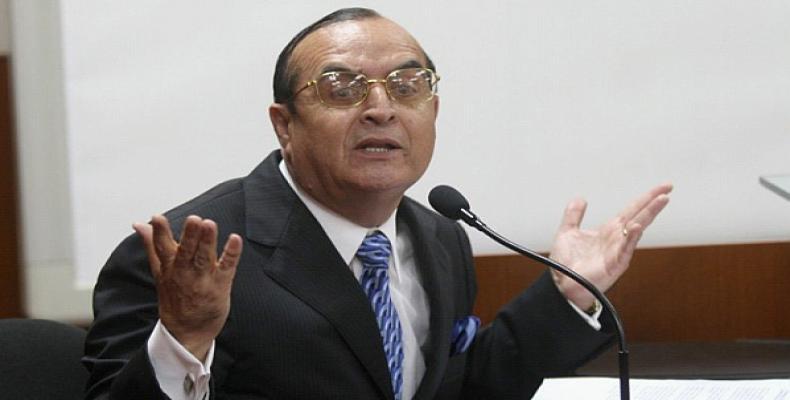Latin America
Related: About this forumAlberto Fujimori, Peru's corrupt ex-president, has just died
it hasn't been reported yet in American media, but in Latin America they're all over it. rip i guess
his daughter Keiko Fujimori reported the death on her X/Twitter account
elleng
(136,071 posts)Keiko Fujimori is the eldest daughter of former Peruvian president Alberto Fujimori and Susana Higuchi. From August 1994 to November 2000, she held the role of First Lady of Peru, during her father's administrations. She has served as the leader of the Fujimorist political party Popular Force since 2010, and was a congresswoman representing the Lima Metropolitan Area, from 2006 to 2011. Fujimori ran for president in the 2011, 2016, and 2021 elections, but was defeated each time in the second round of voting.
https://en.wikipedia.org/wiki/Keiko_Fujimori
SWBTATTReg
(24,094 posts)SharonAnn
(13,883 posts)walznotwalls
(92 posts)Judi Lynn
(162,385 posts)The damage done to the poorest of Peru will take generations to overcome, if ever.
He ruled viciously with his death squads, his spy master, and even took the time to force sterilizations upon innumerable indigenous Peruvian women in order to curtail any chance they and their husbands would be able to start families, or have additional kids.
It was correctly perceived as a form of genocide.
Wikipedia:
Forced sterilization in Peru
Forced sterilizations in Peru (Spanish: esterilizaciones forzosas en Perú) under Alberto Fujimori's government were systematic and aimed to control the population of impoverished and indigenous women, mainly in rural Andean communities. This practice was part of the state-led National Population Program, which emerged from the military's Plan Verde, initially aimed at economic recovery and combating the Shining Path insurgency. The program has been widely condemned as a form of ethnic cleansing or genocide due to its disproportionate impact on rural and indigenous peoples of Peru.
The roots of this program can be traced back to population control measures and eugenics theories that emerged in Peru during the early 20th century. These measures evolved significantly under Fujimori's administration, which justified the sterilizations as a means to alleviate poverty and improve resource distribution by reducing birth rates among the "culturally backward" and economically disadvantaged groups. Despite claims of voluntary participation, many women were often sterilized without informed consent, under threat, or in exchange for food and medical care.[1]
This forced sterilization campaign had lasting socioeconomic and health consequences in the affected communities. The program decimated rural economies, exacerbated poverty, and led to widespread human rights abuses. Efforts to bring justice to the victims have faced numerous obstacles, including government resistance and legal challenges. Although international and national bodies have condemned the actions as crimes against humanity, accountability and reparations for the victims remain limited.
https://en.wikipedia.org/wiki/Forced_sterilization_in_Peru
~ ~ ~
Just found this article regarding Fujimori's spy master, Vladimiro Montesinos and another of his appearances in court, this one only as recent as January, 2024!
Ex-Peruvian intelligence chief pleads guilty to charges in 1992 massacre of six farmers
Updated 5:42 PM CDT, January 29, 2024
LIMA, Peru (AP) — The controversial intelligence chief of former Peruvian President Alberto Fujimori on Monday pleaded guilty to charges in the 1992 massacre of six farmers who were accused of being members of a rebel group, taken from their homes by soldiers and executed in the town of Pativilca.
Vladimiro Montesinos, 78, pleaded guilty to charges of homicide, murder and forced disappearance, for which prosecutors are seeking a 25-year-sentence. The former spy chief’s defense is hoping that the sentence will be reduced due to Montesinos’ willingness to cooperate with Peruvian courts.
Montesinos has been in prison since 2001, charged with numerous counts of corruption schemes and human rights violations. A former army officer and lawyer who defended drug traffickers in the 1980s, he became the head of Peru’s intelligence services during the Fujimori administration in the 1990s.
. . .
But his actions also led to the collapse of Fujimori’s presidency, after clandestine tapes emerged that showed him paying bribes to congressmen, businessmen and media moguls, in an effort to buy support for Fujimori’s government.
https://apnews.com/article/vladimiro-montesinos-masacre-pativilca-cargos-audiencia-peru-2a0f59c2506a850a19152ad3c08ac7f7
~ ~ ~
La Cantuta massacre
- snip -
In April 1993, a group of Peruvian military officers anonymously released a document detailing the events at La Cantuta. Their document claimed the death squad had abducted the victims, tortured and murdered them, and then hurriedly buried them; later, they claimed, after questions had been raised in Congress, that the armed forces had exhumed, incinerated, and reburied the bodies in another location.[citation needed] The military whistleblowers named the members of Grupo Colina involved, identified the operations chief as Major Santiago Martín Rivas, and suggested that the group operated on the orders of Vladimiro Montesinos, head of the National Intelligence Service (SIN) and a close advisor to President Fujimori.
On 6 May, Lt. Gen. Humberto Robles Espinoza, the army's third highest-ranking officer, publicly denounced a number of human rights violations committed by the SIN and the armed forces, including the La Cantuta killings. He was later dismissed from duty and subjected to death threats, and finally fled the country for political asylum in Argentina.[citation needed]
In June 1993, Justo Arizapana Vicente, a recycler, and his friend Guillermo Cataroca, leaked a marked map to congress man Roger Cáceres Velásquez and Radio Comas journalist Juan Jara Berrospi.[4] Cáceres then shared the map with Ricardo Uceda at the news magazine Sí, who published it in July of that year.[5] Mariella Barreto, an agent of the Peruvian Army Intelligence Service, is also sometimes credited with leaking this map to a Peruvian magazine.[6] An investigation of the site indicated on the map by the public prosecutor revealed four clandestine graves. Forensic tests conducted on the remains, and on another set of bones found at another site, revealed that they belonged to Muñoz Sánchez and the students Luis Enrique Ortiz Perea, Armando Amaro Condor, and Juan Gabriel Mariños Figueroa, and that at least some of them had been tortured prior to receiving an execution-style coup-de-grâce to the base of the neck. Barreto was murdered some years later: her decapitated and dismembered corpse, showing signs of ante-mortem torture, was found in March 1997.[7][8] A few weeks after Mariella Barreto's death, her colleague Leonor La Rosa, was on TV in a hospital bed, declaring she had been tortured and that Barreto had been killed in retaliation for leaking information to the press about the Groupo Colina's plan to intimidate journalists and politicians from the opposition.[9]
The military authorities had begun an investigation into the killings in May 1993. In addition, in December 1993, a civilian prosecutor filed criminal charges against several named members of the military. A conflict of jurisdiction thus arose between the military and civilian courts. The controversy was placed before the Supreme Court which, on 3 February 1994, ruled that it was unable to reach agreement on which venue should apply. Consequently, on the night of 7 February, Congress enacted a new law whereby the Supreme Court could decide such matters with a simple majority, instead of a unanimous vote. By a three-to-two vote of the Supreme Court's criminal division, the case was placed under military jurisdiction.[citation needed]
On 21 February 1994, the Supreme Council of Military Justice (CSJM) sentenced ten of the perpetrators to prison sentences of between one and 20 years.[citation needed]
Following Fujimori's landslide re-election in April 1995, in another all-night session on 14 June 1995, Congress enacted law No. 26479, the "Amnesty Law", ordering the release of all police officers, soldiers, and civil servants convicted of or charged with civilian or military crimes during Peru's War on Terrorism. On 15 July, the Supreme Council of Military Justice ordered the release of all the individuals convicted for the La Cantuta killings.
More:
https://en.wikipedia.org/wiki/La_Cantuta_massacre#:~:text=La%20Cantuta%20massacre%20took%20place,Colina%2C%20a%20military%20death%20squad.
ETC., ETC., ETC., ETC.
Peru has been controlled steadily by a virulently racist, hard-right oligarchy with no end in sight, unfortunately.

Alberto Fujimori and his two obsessively driven politician children, Kenji and Keiko who will never stop seeking ultimate power in Peru until they drop in their tracks.

Alberto and the lovely Keiko!

Spy master, death squad director, bribe payer, etc., etc., Vladimir Montesinos

